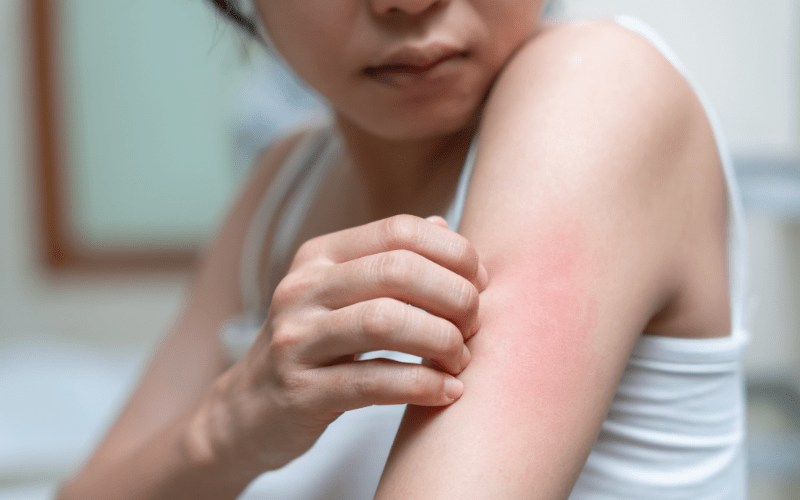Last updated on June 16th, 2025 at 05:27 pm

Dengue Fever Recovery Phase – Dengue fever is a mosquito-borne viral infection that has become a significant public health concern worldwide. In this comprehensive guide, the focus is on understanding dengue fever, the importance of the dengue vaccine, recognizing the symptoms, and exploring various home remedies and prevention tips. The aim is to provide valuable information to help individuals recover from dengue fever and prevent its recurrence.
Understanding Dengue Fever
Dengue fever is caused by the dengue virus, which is transmitted through the bite of infected Aedes mosquitoes. These mosquitoes are mostly found in tropical and subtropical regions, making dengue fever a significant health concern in these areas. The disease is characterized by symptoms such as high fever, severe headache, joint and muscle pain, and sometimes a rash.
There are four distinct serotypes of the dengue virus (DENV-1, DENV-2, DENV-3, and DENV-4), and infection with one serotype provides immunity to that specific serotype for life. However, subsequent infections with other serotypes can lead to more severe forms of the disease, such as dengue hemorrhagic fever (DHF) and dengue shock syndrome (DSS). These severe forms can be life-threatening and require immediate medical attention.
The World Health Organization (WHO) estimates that around 390 million dengue infections occur each year, with approximately 96 million cases resulting in clinical symptoms. To combat this growing health concern, researchers have been working on developing a dengue vaccine that can provide long-lasting protection against all four serotypes of the virus.
Dengue Fever Recovery Phase
The development of a dengue vaccine has been a challenging task for researchers due to the complex nature of the dengue virus and its interaction with the human immune system. In recent years, however, progress has been made with the approval of the first dengue vaccine, Dengvaxia, in several countries.
Dengvaxia is a live attenuated tetravalent vaccine that provides protection against all four dengue serotypes. It is effective in reducing the risk of severe dengue and hospitalization in individuals aged 9-45 years living in endemic areas. However, the vaccine’s efficacy varies depending on the individual’s prior dengue exposure and the specific serotype involved.
While the dengue vaccine is a significant step forward in dengue fever prevention, it is not a complete solution. The vaccine is not recommended for individuals who have not been previously exposed to dengue, as it may increase the risk of severe dengue in these individuals. Moreover, the vaccine does not provide complete protection against the disease, and other preventive measures, such as mosquito control and personal protective measures, still play a crucial role in reducing the risk of dengue infection.
Recovery Phase of Dengue Symptoms
Early recognition of dengue fever symptoms is essential to ensure timely and appropriate medical care. Dengue fever’s symptoms typically appear suddenly 4-10 days after the incubation period and last for 2-7 days. Among the symptoms of dengue fever are the following:
- High fever (104°F or 40°C)
- Severe headache
- Pain behind the eyes
- Joint and muscle pain
- Nausea and vomiting
- Swollen glands
- Rash
Effective medication for reducing pain & fever during Dengue – RUMANIL TABLET
In some cases, dengue fever can progress to more severe forms, such as dengue hemorrhagic fever (DHF) and dengue shock syndrome (DSS). The following are indicators of severe dengue:
- Severe abdominal pain
- Persistent vomiting
- Rapid breathing
- Bleeding gums
- Blood in vomit
- Fatigue and restlessness
Immediate medical attention is crucial if any severe dengue warning signs are observed, as it can be life-threatening..
Dengue Recovery Time
The dengue recovery time varies depending on the severity of the illness and the individual’s immune response. In most cases, individuals with mild dengue fever begin to recover within a week after the onset of symptoms. However, the recovery process may take longer for those who experience more severe symptoms or complications.
During the dengue recovery time, it is essential to get plenty of rest, stay well-hydrated, and maintain a healthy diet to support the immune system’s fight against the virus. It is also crucial to monitor for any signs of worsening symptoms or complications and seek medical attention as needed.
Related:
Home Remedies for Dengue Fever
While there is no specific treatment for dengue fever, several home remedies can help alleviate the symptoms and support the body’s natural healing process. These remedies include:
- Hydration: Maintaining proper hydration is critical during dengue fever, as dehydration can exacerbate symptoms and lead to complications. Drinking water, coconut water, or oral rehydration solutions can help replace lost fluids and electrolytes.
- Papaya leaf extract: Papaya leaf extract has been used in traditional medicine for its potential benefits in treating dengue fever. Some studies suggest that it may help increase platelet count and reduce symptoms such as fatigue and weakness. To verify these effects, more study is required.
- Cold compress: Applying a cold compress to the forehead can help alleviate headaches and fever associated with dengue fever. This can be done by soaking a cloth in cold water, wringing out the excess water, and applying it to the forehead for 10-15 minutes.
Herbal Remedies for Dengue Fever
In addition to the home remedies mentioned above, several herbal remedies have been traditionally used to help alleviate dengue fever symptoms. These include:
- Giloy: Also known as Tinospora cordifolia, giloy is an Ayurvedic herb with immunomodulatory and antiviral properties. It is believed to help boost the immune system and reduce fever, joint pain, and fatigue associated with dengue fever.
- Tulsi: Ocimum sanctum, commonly known as holy basil or tulsi, is another Ayurvedic herb with potential benefits in treating dengue fever. It is thought to have antiviral and anti-inflammatory properties that can help reduce fever and inflammation.
- Neem: Azadirachta indica, or neem, is a medicinal plant with antiviral and immunomodulatory properties. Neem leaves are traditionally used to help alleviate dengue fever symptoms, such as fever, joint pain, and rash.
It is essential to consult with a healthcare professional before using any herbal remedies to ensure their safety and effectiveness.

Dengue Medicine Names
While there is no specific antiviral medication for dengue fever, over-the-counter pain relievers and fever reducers, such as acetaminophen (paracetamol), can help alleviate symptoms. However, it is essential to avoid aspirin and nonsteroidal anti-inflammatory drugs (NSAIDs), such as ibuprofen and naproxen, as these medications can increase the risk of bleeding complications.
Severe dengue cases may need hospitalization for IV fluid therapy, blood transfusion, or other supportive care measures.
Dengue Tablets
There are no specific dengue tablets or antiviral medications available to treat dengue fever. However, over-the-counter pain relievers and fever reducers, such as acetaminophen (paracetamol), can help alleviate symptoms. As mentioned earlier, it is crucial to avoid aspirin and nonsteroidal anti-inflammatory drugs (NSAIDs), such as ibuprofen and naproxen, as they can increase the risk of bleeding complications.
> Consult a Doctor and Medkart will help you Order Medicines Online
Tips for Dengue Fever Recovery Phase
Preventing dengue fever is essential, as there is no specific treatment for the illness. Dengue fever prevention focuses on reducing the risk of mosquito bites and controlling mosquito populations. The following tips can help prevent dengue fever:
- Use mosquito repellents: Apply mosquito repellents containing DEET, picaridin, or IR3535 on exposed skin and clothing to protect against mosquito bites.
- Wear protective clothing: Wear long sleeves, long pants, and socks to minimize skin exposure and reduce the risk of mosquito bites.
- Eliminate mosquito breeding sites: Regularly check for and remove standing water around the home, such as in flower pots, containers, and tires, as these can serve as mosquito breeding sites.
- Install screens and bed nets: Use window screens and mosquito nets to prevent mosquitoes from entering the home and protect against mosquito bites while sleeping.
- Stay informed: Stay updated on local dengue fever outbreaks and take extra precautions during periods of increased dengue transmission.
Read: What are Generic Medicines?
Conclusion:
Dengue fever is a significant public health concern worldwide, and understanding the disease, recognizing its symptoms, and employing preventive measures are crucial to combating its spread. While the development of the dengue vaccine is a significant step forward in dengue fever prevention, it is essential to continue practising personal protective measures, such as using mosquito repellents and eliminating mosquito breeding sites. In addition, home remedies such as hydration, papaya leaf extract, and cold compresses can help alleviate symptoms and support the body’s natural healing process.
It is important to note that If severe dengue warning signs appear, seek immediate medical attention. Hospitalization may be required for intravenous fluid therapy, blood transfusion, or other supportive care measures.
In conclusion, by taking preventive measures, recognizing the symptoms, and seeking appropriate medical care, individuals can recover from dengue fever and prevent its recurrence. Together, we can work towards reducing the global burden of this mosquito-borne viral infection.
Related Links:
Call To Action:
Visit Medkart to get the best generic medicines at the lowest prices, today!